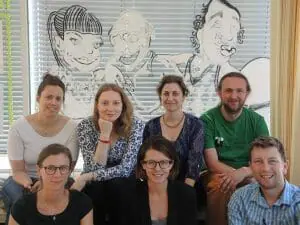
The Global Consortium for Sustainability Outcomes is a non-profit international consortium of universities that collaborate to implement and scale solutions to sustainability challenges. GCSO membership spans seven countries on three continents, enabling universities to work together in partnership with each other and with governments, businesses, schools and NGOs.
“GCSO is the only consortium focused on taking sustainability solutions developed in the university setting and transferring them to people and organizations that can affect change,” says Dr. Rob Melnick, Executive Director of Arizona State University’s (ASU) Julie Ann Wrigley Global Institute of Sustainability and School of Sustainability, as well as ASU’s representative to GCSO. “At a time when sustainability problems are growing faster than solutions are being implemented, GCSO provides a global vehicle to accelerate interventions that address this gap.”
In GCSO’s first year, there are three Consortium-funded projects. Each project goes beyond research, collaborating with implementers to achieve sustainability outcomes.
The first helps K-12 teachers integrate sustainability principles into their curriculum. Teachers engage in competency-based workshops offered in Germany, Ireland and Mexico, with plans to include additional international locations in year two. Project participants convened at Leuphana University of Lüneburg, Germany this April to design the Continuing Professional Development for K-12 package and implementation strategy.

Top to bottom, left to right: Corrie Griffith (ASU); Kaidi Tamm (KIT); Amy Lerner (UNAM); Richard Beecroft (KIT); Beatrice John (LUL); Lauren Withycombe Keeler (ASU); Fletcher Beaudoin (PSU)
The second project entails working with city staff to address high-priority sustainability issues. Five collaborating GCSO member institutions met for a kick-off workshop earlier this month at the Karlsruhe Institute of Technology in Germany to better understand sustainability implementation capacity across the five cases: Mexico City, Mexico; Karlsruhe, Germany; Lüneburg, Germany; Portland, Oregon (USA); and Tempe, AZ (USA).
A third, solutions-focused project is enabling universities and cities to reduce their GHG emissions by eliminating unnecessary hot water use in public buildings. The project is being piloted at universities in London (King’s College London), Toronto (University of Toronto) and Dublin (Dublin City University). In addition to reducing energy use and associated costs, the project also looks at what is required to promote behavior change among building users. Experimentation began this summer, and is already yielding insights that GCSO members can learn from and plan to transfer to city government in each location.
“In a short time, the Consortium has enabled each member university to develop strong working relationships with other ‘like-minded’ universities committed to implementing solutions,” says Jenny Carter, GCSO’s Director. “This approach is important if we are going to address at scale critical global sustainability challenges.”